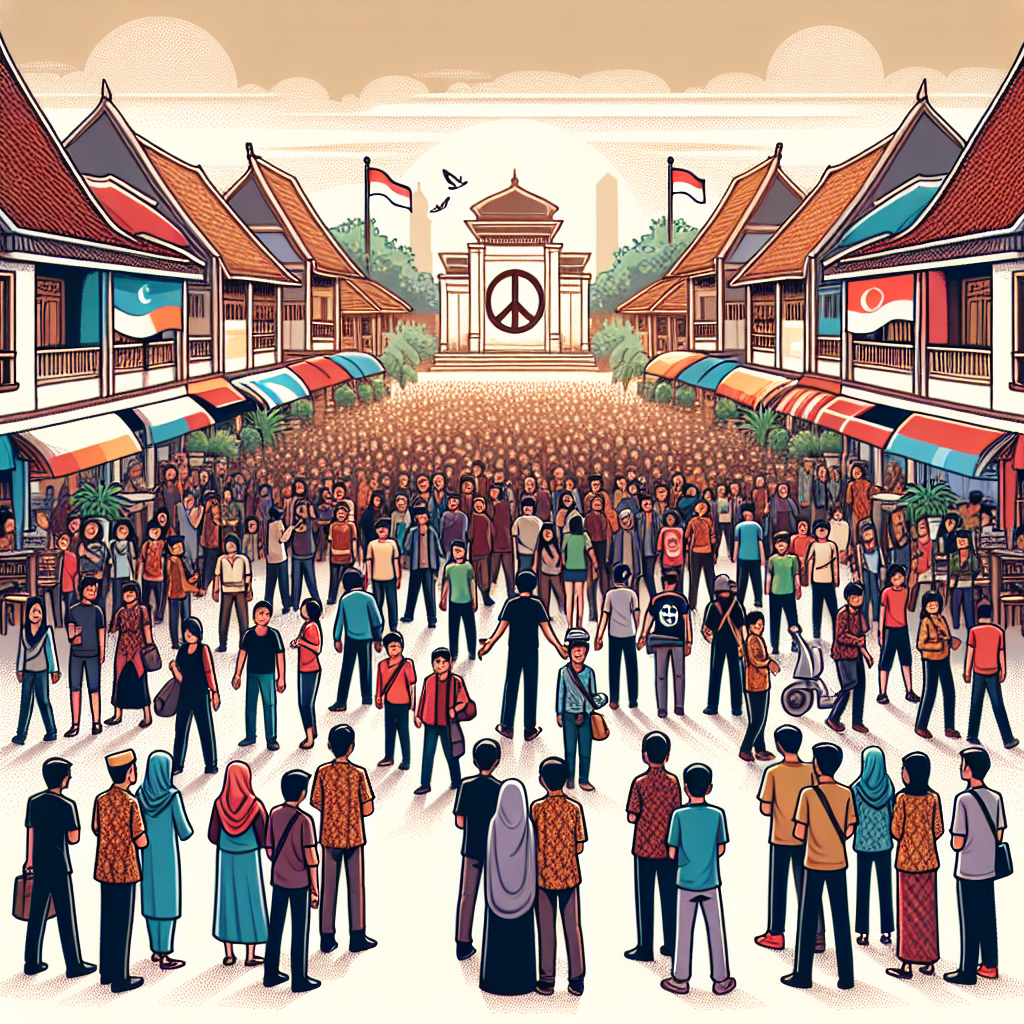Konflik sosial antar kelompok di Indonesia melibatkan perbedaan agama, suku, dan politik yang seringkali memicu ketegangan dan kekerasan.
Konflik Sosial Antar Kelompok di Indonesia
-
Table of Contents
- Introduction
- Ethnic Conflicts
- Historical Grievances
- Competition for Resources
- Political Marginalization
- Religious Conflicts
- Differences in Religious Beliefs
- Competition for Religious Dominance
- Politicization of Religion
- Political Conflicts
- Power Struggles
- Ideological Differences
- Competition for Resources
- Consequences of Social Conflicts
- Social Consequences
- Economic Consequences
- Political Consequences
- Potential Solutions
- Dialogue and Mediation
- Inclusivity and Representation
- Addressing Socio-economic Inequalities
- Strengthening Rule of Law and Accountability
- Summary
Introduction

Indonesia, with its diverse ethnic, religious, and cultural makeup, has experienced various forms of social conflict throughout its history. These conflicts arise from differences in beliefs, values, and interests among different groups within the society. Social conflict between groups in Indonesia can be categorized into several types, including ethnic, religious, and political conflicts. This article aims to explore the causes, consequences, and potential solutions to social conflicts between groups in Indonesia.
Ethnic Conflicts
Indonesia is home to hundreds of ethnic groups, each with its own unique culture, language, and traditions. While diversity is often celebrated, it can also be a source of tension and conflict. Ethnic conflicts in Indonesia often stem from historical grievances, competition for resources, and political marginalization.
Historical Grievances
Many ethnic conflicts in Indonesia have deep historical roots. The country’s colonial past, with its policies of divide and rule, has left a legacy of resentment and mistrust among different ethnic groups. For example, the conflict between the Acehnese and the Javanese can be traced back to the Dutch colonial era when the Acehnese fought against Dutch rule. These historical grievances often resurface during times of political instability or economic inequality.
Competition for Resources
Indonesia’s vast natural resources, such as oil, gas, and minerals, have been a source of both wealth and conflict. In resource-rich regions like Papua and Kalimantan, conflicts often arise between indigenous communities and companies seeking to exploit these resources. The local communities feel marginalized and excluded from the benefits of resource extraction, leading to tensions and sometimes violent clashes.
Political Marginalization
Political marginalization is another factor contributing to ethnic conflicts in Indonesia. Some ethnic groups feel that they are not adequately represented in the political arena, leading to a sense of exclusion and frustration. This can result in protests, demonstrations, and even violence as marginalized groups seek to assert their rights and demand greater political participation.
Religious Conflicts
Religion plays a significant role in Indonesian society, with the majority of the population identifying as Muslims. However, Indonesia is also home to various religious minorities, including Christians, Hindus, Buddhists, and others. Religious conflicts in Indonesia often arise from differences in religious beliefs, competition for religious dominance, and the politicization of religion.
Differences in Religious Beliefs
Indonesia’s religious diversity can sometimes lead to tensions and conflicts. Differences in religious beliefs and practices can create misunderstandings and fuel intolerance. For example, conflicts between Muslims and Christians in Maluku and Poso were fueled by religious differences and exacerbated by political and economic factors.
Competition for Religious Dominance
Religious conflicts in Indonesia can also be driven by competition for religious dominance. Some groups may seek to establish their religious beliefs as the dominant or official religion, leading to tensions with other religious communities. This competition for religious dominance can be seen in conflicts between Muslims and Ahmadiyya or Shia communities, who are considered deviant by some mainstream Muslim groups.
Politicization of Religion
Religion has been increasingly politicized in Indonesia, with politicians using religious rhetoric to gain support and mobilize their base. This politicization of religion can lead to the marginalization of religious minorities and the stigmatization of certain religious groups. It can also create a fertile ground for the spread of extremist ideologies and acts of violence.
Political Conflicts
Political conflicts in Indonesia often arise from power struggles, ideological differences, and competition for resources. These conflicts can occur at various levels, from local to national politics, and can have far-reaching consequences for the stability and development of the country.
Power Struggles
Power struggles between political elites and parties are a common source of political conflicts in Indonesia. These conflicts often revolve around issues of corruption, nepotism, and the control of resources. The competition for power can lead to political instability, protests, and even violence as different factions vie for control.
Ideological Differences
Ideological differences between political groups can also contribute to political conflicts in Indonesia. The country has a diverse political landscape, with parties representing various ideologies, from secular nationalism to Islamic conservatism. These ideological differences can lead to polarization and conflicts over issues such as governance, human rights, and social justice.
Competition for Resources
Competition for resources, particularly at the local level, can also fuel political conflicts in Indonesia. Local elections often become battlegrounds for rival groups seeking to control valuable resources, such as land, mining concessions, or infrastructure projects. The manipulation of these conflicts by political elites can further exacerbate tensions and lead to violence.
Consequences of Social Conflicts
Social conflicts between groups in Indonesia have significant consequences for the affected communities and the country as a whole. These consequences can be social, economic, and political in nature.
Social Consequences
Social conflicts can lead to the displacement of communities, loss of lives, and the destruction of infrastructure. They can also deepen divisions and create a climate of fear and mistrust among different groups. Social conflicts can disrupt social cohesion and hinder efforts towards national unity and development.
Economic Consequences
Economically, social conflicts can have a detrimental impact on local economies and investment. The uncertainty and instability caused by conflicts can deter investors and disrupt economic activities. In resource-rich regions, conflicts can also hinder the sustainable development of natural resources, depriving local communities of potential economic benefits.
Political Consequences
Politically, social conflicts can undermine the legitimacy and stability of the government. They can erode public trust in institutions and lead to a loss of confidence in the ability of the state to maintain law and order. Social conflicts can also divert attention and resources away from pressing national issues, hindering the country’s progress and development.
Potential Solutions
Addressing social conflicts between groups in Indonesia requires a multi-faceted approach that addresses the root causes and promotes dialogue, inclusivity, and justice.
Dialogue and Mediation
Dialogue and mediation play a crucial role in resolving social conflicts. Facilitating open and constructive dialogue between conflicting groups can help build understanding, trust, and empathy. Mediation processes can provide a platform for conflicting parties to negotiate and find mutually acceptable solutions.
Inclusivity and Representation
Promoting inclusivity and representation is essential in preventing and resolving social conflicts. Ensuring that all groups have a voice in decision-making processes and are adequately represented in political institutions can help address feelings of marginalization and exclusion.
Addressing Socio-economic Inequalities
Socio-economic inequalities often underlie social conflicts. Addressing these inequalities through inclusive economic policies, poverty reduction programs, and equitable resource distribution can help alleviate tensions and promote social harmony.
Strengthening Rule of Law and Accountability
Strengthening the rule of law and ensuring accountability for human rights violations are crucial in preventing and resolving social conflicts. Impunity for past crimes can perpetuate cycles of violence and hinder reconciliation efforts. Holding perpetrators accountable and providing justice for victims can contribute to healing and reconciliation.
Summary
Social conflicts between groups in Indonesia, whether ethnic, religious, or political, have deep historical roots and can have significant consequences for the affected communities and the country as a whole. These conflicts arise from differences in beliefs, values, and interests among different groups within the society. Addressing social conflicts requires a multi-faceted approach that includes dialogue, inclusivity, addressing socio-economic inequalities, and strengthening the rule of law. By promoting understanding, justice, and reconciliation, Indonesia can strive towards a more harmonious and united society.







